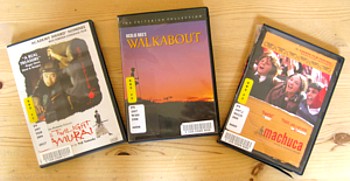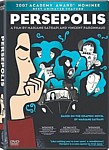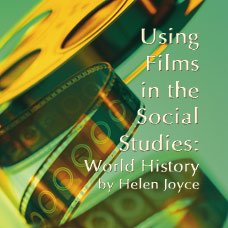| Feature Films
for Teaching World History?
Extra credit feature films for college World History survey
course. In the introductory World History survey course at the
UC Santa Barbara, I break up some 75-minute lecture periods by showing
pertinent clips from documentary and feature films. I sometimes show an
entire film or two in a separate evening session, and I suggest that students
can view the whole film on their own. In 2008 one of my teaching assistants
suggested that we show the films at the campus Multicultural Center theater
for extra credit. I took the idea a step further, and decided to make an
extra credit film series, with a showing or two every week.
Which films? The next step was to choose ten suitable
films. Our criteria were to try to cover the major cultural areas of the
world, with a preference for films made in that area (as opposed to Hollywood
productions about it), and also to span the time period from the 1700s
to recent times. The lists below are the films we came up with, plus some
gleaned from colleagues' World History teaching websites. Due to availability
and other constraints, here are the
Films I actually showed in 2008 (with dates when the
events in the film take place):
Jefferson in Paris (1784; also showed 5 min. clip in lecture
on Enlightenment)
Amistad (1839-41 US; showed clip in lecture on antislavery)
Twilight Samurai (1865; Meiji restoration in Japan)
Walkabout (1971 Australia; abandoned white kids saved by aborigine
in outback)
Machuca (1973 Chile; rich boy meets poor girl before/during Allende
assassination)
Gandhi (1905-1948; biopic, lecture clip: first non-violent action
in S. Africa)
Seven Years in Tibet (1939-46; Austrian skier meets Dalai Lama
in WW2 Lhasa)
Escape from Sobibor (1943 Poland; Sobibor survivor Th. Blatt spoke
to our class)
Persepolis (1978-87, mostly Iran; shown in SB Human Rights film
festival)
Blood Diamond (1999; Sierra Leone fisherman & Zimbabwean white
mercenary)
Films shown/used in 2009:
Paradise Now (2005), 90 mins [shown on campus]
Twilight Samurai (1865 Japan)
[lecture: Kerry Kennedy, "Speak Truth to Power" -- campus event for extra credit]
Oktober (Ten Days that Shook the World) (Feb-Oct. 1917, Russia)
Gandhi (1905-1948 biopic, India)
Seven Years in Tibet (1939-46, Austria/Tibet/China)
Persepolis (1978-87 Iran)
Born into Brothels (contemporary India)
Films shown in 2011:
Burn! (1969)
Jefferson in Paris (1995 about 1784-89)
Modern Times (1937)
Twilight Samurai (1865 Japan)
Gandhi (1905-1948 biography, S. Africa & India)
All Quiet on the Western Front (1930 film about 1914-18 WWI in Germany)
Battleship Potemkin (1925; 1905 Russia)
La Rafle (1942 France--public showing on campus)
Cry Freedom (1970-77 apartheid South Africa)
Battle of Algiers (1966, about French colonial policy 1958-62)
Films shown in 2014:
Amistad (1997, 2:32), 1839-41 U.S.
Jefferson in Paris (1995, 2:19), 1784 Paris Oct. 22:
[The Blue Kite (1993, 2:18), 1950s & 60s China] Modern Times (1937)
Gallipoli (1:51), 1915 Australia & Ottoman Empire
Moscow Doesn't Believe in Tears (1979, 2:20), 1958 & 1979 Soviet Union (wikip.)
Cry Freedom (1987, 2:39), 1970s South Africa Dec. 10:
Persepolis (2007, 1:35), 1978-87 Iran
Policies for the extra credit films. These are the
guidelines I used to give the credit:
- Students had to write their name, the film title, and a few notes on
the index card one of the TAs distributed at the screening, and give it
to their TA during the showing week. The TAs collected these, and granted up to a maximum of
four points extra credit on the final grade.
- In 2011 I modified this policy: 1 point for 1 film, 2 pts for 2 films, and 3 points for 4 films.
- If students could not attend the showing, they could obtain the film
on their own and watch it. If I had a personal copy of the DVD or tape,
I placed it on reserve at the library.
- Students had to show their TA a copy of their class or work schedule
showing the conflict. (We prefered them to attend the showing if possible,
to fill the theater and limit distracted viewing on a small screen.)
- They had to submit to their TA: a 1-page (ca. 250-300 word) answer
to a question: How have the concepts presented in the course helped me
to understand the film?
Or: How does the film reflect some concepts taught in the course?
- This had to be done within one week of the official showing time, including
submitting the card to the student's TA in section or lecture. ("Do
not come with a bunch of cards at the end of the quarter...")
|


 (
(